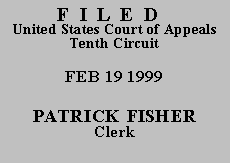

| UNITED STATES OF AMERICA,
Plaintiff-Appellee, Defendant-Appellant. |
No. 97-4189
(D.C. No. 97-CV-561J) (Utah) |
Richard Burdell Thompson was convicted of drug and firearms violations in August 1992 and sentenced to 150 months in October 1992. On July 18, 1997, he filed a motion to vacate, set aside or correct his sentence under 28 U.S.C. § 2255. The district court dismissed the motion as untimely under the one-year limitation period established by the Antiterrorism and Effective Death Penalty Act of 1996, Pub. L. No. 104-132, 110 Stat. 1214 (Apr. 24, 1996) (AEDPA), which amended section 2255 by imposing a time limit on motions under that section.(1) Mr. Thompson appeals and applies for a certificate of appealability.(2) We deny his application and dismiss his appeal.
In United States v. Simmonds, 111 F.3d 737 (10th Cir. 1997), this court addressed the applicability of AEDPA's one-year limitation period to convictions that, as here, had become final prior to the Act's effective date of April 24, 1996. We held that prisoners such as Mr. Thompson must be given a reasonable time after passage of the Act to bring their claims, and we further held that the one-year period provided by the Act "is also a reasonable time for prisoners to bring § 2255 motions whose convictions became final before the [AEDPA] took affect. Accordingly, prisoners whose convictions became final on or before April 24, 1996 must file their § 2255 motions before April 24, 1997." Id. at 746.
Mr. Thompson's conviction became final in 1992. He did not file his section 2255 motion until July 18, 1997, well beyond the April 24, 1997, deadline established by our holding in Simmonds. Accordingly, his motion is not timely.
Because Mr. Thompson has not "made a substantial showing of the denial of a constitutional right" as required for the issuance of a certificate of appealability, 28 U.S.C. § 2253(c)(2), we DENY his motion for a certificate and DISMISS the appeal.
ENTERED FOR THE COURT
Stephanie K. Seymour
Chief Judge
*.This order and judgment is not binding precedent, except under the doctrines of law of the case, res judicata, or collateral estoppel. The court generally disfavors the citation of orders and judgments; nevertheless, an order and judgment may be cited under the terms and conditions of 10th Cir. R. 36.3.
1. The Act provides in relevant part that a one-year limitation period shall apply to a motion under section 2255, running from "the date on which the judgment of conviction becomes final." 28 U.S.C. § 2255.
2. By General Order, "this court directs the district courts to consider the propriety of issuing certificates of appealability in the first instance. Failure of the district court to issue a certificate of appealability within thirty days of filing the notice of appeal shall be deemed a denial." General Order of October 1, 1996. Because the district court did not act on Mr. Thompson's motion for a certificate of appealability, we deem it denied by the district court and consider the motion Mr. Thompson filed here.